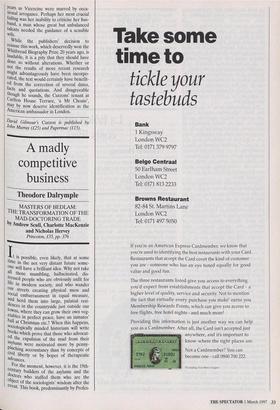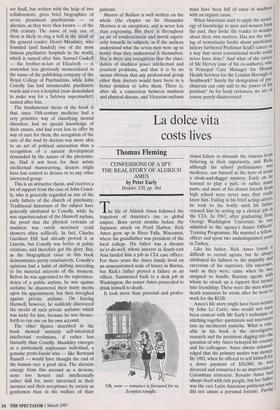A madly competitive business
Theodore Dalrymple
MASTERS OF BEDLAM: THE TRANSFORMATION OF THE MAD-DOCTORING TRADE by Andrew Scull, Charlotte MacKenzie and Nicholas Hervey Princeton, £35, pp. 376 I t is possible, even likely, that at some time in the not very distant future some- one will have a brilliant idea. Why not take all those mumbling, hallucinated, dis- tressed people who are obviously unfit for life in modern society, and who wander our streets creating physical mess and social embarrassment in equal measure, and herd them into large, palatial resi- dences in the countryside just outside our towns, where they can grow their own veg- etables in perfect peace, have an inmates' ball at Christmas etc.? When this happens, sociologically minded historians will write books which prove that those who advocat- ed the expulsion of the mad from their asylums were motivated more by penny- !)Inching accountancy than by concepts of Civil liberty or by hopes of therapeutic advances.
For the moment, however, it is the 19th- century builders of the asylums and the doctors who staffed them who are the object of the sociologists' wisdom after the event. This book, predominantly by Jrofes- sor Scull, but written with the help of two collaborators, gives brief biographies of seven prominent psychiatrists — or alienists, as they were then known — of the 19th century. The name of only one of them is likely to ring a bell in the mind of the general reader: Henry Maudsley, who founded (and funded) one of the most famous psychiatric hospitals in the world, which is named after him. Samuel Gaskell — the brother-in-law of Elizabeth — is somewhat less gloriously memorialised in the name of the publishing company of the Royal College of Psychiatrists, while John Conolly has had innumerable psychiatric wards and even a hospital (now demolished to make way for a Safeway supermarket) named after him.
The fundamental thesis of the book is that, since 19th-century medicine had a very primitive way of classifying mental disorders, had no special knowledge of their causes, and had even less to offer by way of cure for them, the arrogation of the care of the mad by doctors was more akin to an act of political annexation than a recognition of a natural development demanded by the nature of the phenome- na. Had it not been for their astute intellectual manoeuvring, doctors might have lost control to divines or to any other interested group.
This is an attractive thesis, and receives a lot of support from the case of John Conol- ly, who is generally regarded as one of the early fathers of the church of psychiatry. Traditional historians of the subject have generally attributed to Conolly, while he was superintendent of the Hanwell asylum, the proof that the physical restraint of madmen was rarely necessary (cold showers often sufficed). In fact, Charles Gardiner Hill had already proved it at Lincoln, but Conolly was better at public relations, and therefore got the glory. But, as the biographical essay in this book demonstrates pretty conclusively, Conolly's opinions had a habit of shifting according to his material interests of the moment. Before he was appointed to the superinten- dency of a public asylum, he was against asylums; he discovered their many merits upon his appointment, but then inveighed against private asylums. On leaving Hanwell, however, he suddenly discovered the merits of such private asylums: which was lucky for him, because he was thence- forth to run one on his own account.
The other figures described in the book showed similarly self-interested intellectual evolutions, if rather less blatantly than Conolly. Maudsley emerges as a particularly unpleasant individual, a genuine proto-fascist who — like Bertrand Russell — would have thought the end of the human race a good idea. The alienists emerge from this account as a devious, none too honest and intellectually rather dull lot, more interested in their incomes and their acceptance by society as gentlemen than in the welfare of their patients.
Masters of Bedlam is well written on the whole (the chapter on Sir Alexander Morison is an exception), and is never less than engrossing. But there is throughout an air of condescension and moral superi- ority towards its subjects, as if the authors understood what the seven men were up to better than they understood it themselves. Nor is there any recognition that the eluci- dation of madness poses intellectual and practical problems, and that it is by no means obvious that any professional group other than doctors would have been in a better position to solve them. There is, after all, a connection between madness and physical disease, and Victorian asylums must have been full of cases of madness with an organic cause. When historians start to apply the sociol- ogy of knowledge to men and women from the past, they invite the reader to wonder about their own motives. Has not the writ- ing of iconoclastic books about psychiatric history furthered Professor Scull's career in a way that more conventional works could never have done? And what of the career of Mr Hervey (one of his co-authors), who is Principal Care Manager for Mental Health Services for the London Borough of Southwark? Surely the denigration of psy- chiatrists can only add to the power of his position? As for book reviewers, we are of course purely disinterested.



























































 Previous page
Previous page